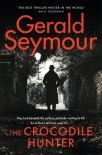The Crocodile Hunter by Gerald Seymour (english novels to improve english txt) 📗

- Author: Gerald Seymour
Book online «The Crocodile Hunter by Gerald Seymour (english novels to improve english txt) 📗». Author Gerald Seymour
And would have the same the next day which was her usual feast on her birthday. She’d have a card from the gaol. Always a pretty one, always the only one.
She ate the toast, could not be bothered to peel an apple. Made a cup of tea with yesterday’s teabag. If she sat down and wept then the likelihood was that she’d go into the trees at the back and sling a rope over a branch and find something to stand on and . . . She often took the wastebins’ newspapers, and the colour supplements, and brought them home: would never sit down and let the tears come. She kept a shrine to Cameron, the room he had taken over when his half-sister had been killed, mangled and unrecognisable in the crash. Drank the tea and climbed the stairs.
The room was never opened. Was as the counter-terror police had left it.
They had come in, mob-handed. Cold and polite, but with an air of contempt for her, like she was responsible. Behaved correctly until they had reached Cameron’s room. Had torn it apart . . . She had sat on the stairs and the front door had been open and she had seen the net curtains flicking across the street, and had noted that the dog-walkers and the buggy-pushers averted their eyes and kept on the move, but would have seen – and would have heard.
Shelves down, cupboards and drawers dismantled, carpet ripped up off its tacks and the floorboards screaming as they were lifted, bed stripped and the mattress slashed open. Some broken glass, might have been the picture frames, and china fragments because they had cracked open a piggy bank. Sadie had not uttered a word that day, did not cry now. Probably they would have been in better humour if they had found some black flag propaganda leaflets or posters, or a heap of books on revolutionary warfare. Nothing there to soften the blow of a failed search, had even slit open the little beggar’s bear which had been with him for nearly 20 years and had been hidden away at the back of a wardrobe shelf, had spilled out its guts. They had left shamefaced. A heavy footfall coming down the stairs and she’d not shifted her backside, not an inch, had made them step around her. They had driven away, she had gone up and had looked into his room. Had gazed at the chaos, had been knifed by the humiliation. Damaged furniture, scattered clothes, dumped pictures of a fresh-faced chorister. Had closed the door. Would have locked it if there had been a key. Had closed it and had never opened it again. A sort of sealed shrine. The way it would stay and the anger at what Cameron had inflicted on her would never leave, her promise.
She went into her bedroom. Had a photograph there of her elder son who always wrote cheerfully from his cell block, claimed he was doing well. Had another photograph – of her daughter, and went once a week to talk to her. Had no picture of Cameron.
She lay on the bed, closed her eyes, but did not sleep.
“It’s out of a clear blue sky, figuratively that is . . .”
Tristram and Izzy stood at the entrance to Jonas Merrick’s work area. Listened. Both would have tried to disguise their inability to fathom the logic of his remark.
“That’s the way things are, where they always come from – the juicy ones and the frightening ones – out of a clear blue sky.”
Tristram said, “Understood.”
Izzy said, “Least expected.”
“It comes from a clear blue sky.”
On his screen Jonas had the message from Lily, sent up from the bowels of the building. “A clear blue sky is the time when our guard is lowered. Cannot help it, fact of life. It is when our alertness is dulled, and suspicions . . . There was a ferocious storm last night, even rattled the roof-tiles in Raynes Park, but out at sea, in the open Channel, it would have been horrendous. Imagine an open dinghy, a pump-up job, and it has seven passengers on it and it’s coming through fierce waves and swell and also crossing the twin shipping lanes. Precautions to intercept migrants are at base-level on the French side, and on ours. Anyone who goes into the water in those circumstances has a pressing reason to get here. When it is close to the beach at Deal, the weather alters and the storm drops and a patrol boat is launched. In these calmer conditions its radar picks up the dinghy. End of story? Not quite. At first light there is a sea mist and the patrol cutter cannot make a positive sighting, has to rely on the electronics. The dinghy runs aground. Local people help ashore six Iranian nationals, and they say they are Christians. Likely to plead persecution and stand a good chance of some sort of permission to stay. Straightforward. End of story. Too easy. They said a man was with them – described him as an ‘angel’.”
Jonas Merrick’s voice was staccato, matter of fact. He never used theatre to emphasise bullet points, his tone did not vary. Nor did he look at them.
“They say without him they would not have crossed. Without him they would have drowned. At the darkest moments, when they might have been swamped, capsized, no life-jackets, he led them in the singing of hymns. They are Christians, know their Ancient and Modern. As he did. He brings them within a hundred yards of the





Comments (0)